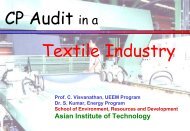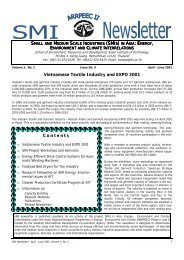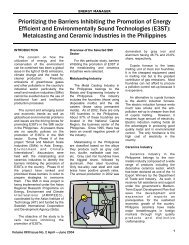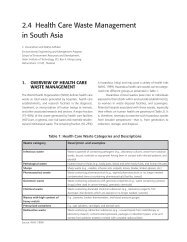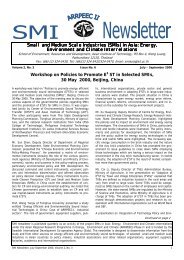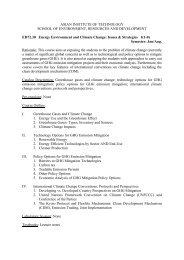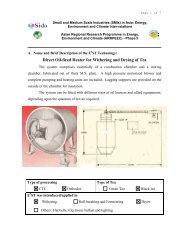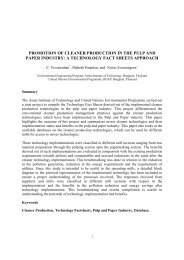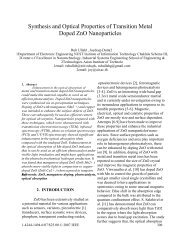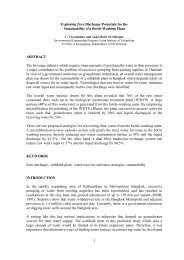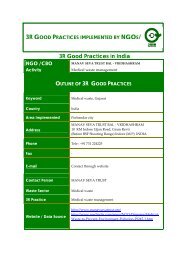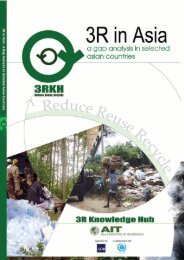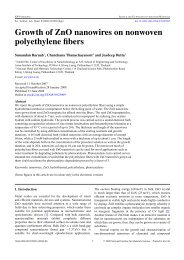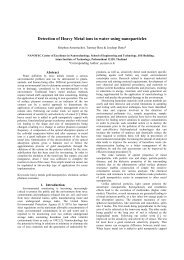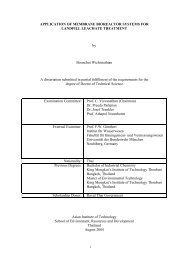Evaluation of Plastic Waste Management in Thailand Using Material ...
Evaluation of Plastic Waste Management in Thailand Using Material ...
Evaluation of Plastic Waste Management in Thailand Using Material ...
Create successful ePaper yourself
Turn your PDF publications into a flip-book with our unique Google optimized e-Paper software.
50% <strong>of</strong> agricultural products was converted to wastes <strong>in</strong> 2010. Figure D-1 <strong>in</strong> Appendix D<br />
presents the sub-process <strong>of</strong> the plastic consumption process. Table D-1 <strong>in</strong> Appendix D<br />
shows amounts <strong>of</strong> plastic waste generation from each k<strong>in</strong>d <strong>of</strong> plastic product <strong>of</strong> the plastic<br />
consumption process. Most thermosett<strong>in</strong>g products are the long-lived products, so the<br />
assumption is only 1% <strong>of</strong> thermosett<strong>in</strong>g waste generation from the plastic consumption.<br />
Figure 4.23 shows the plastic consumption process <strong>in</strong> the plastic material flow <strong>in</strong> <strong>Thailand</strong><br />
<strong>in</strong> 2010.<br />
Figure 4.23 <strong>Plastic</strong> consumption process <strong>of</strong> plastic material flow <strong>in</strong> <strong>Thailand</strong>, 2010<br />
The negative stock <strong>of</strong> this process means that the amount <strong>of</strong> waste generation (reported by<br />
PCD <strong>in</strong> 2010) is more than the amount <strong>of</strong> product <strong>in</strong>put. The assumption <strong>of</strong> plastic<br />
consumption <strong>of</strong> each activity was set, and the assumed stock from that assumption was<br />
equal to 1.53 million tonnes. The amount <strong>of</strong> actual product stocked <strong>in</strong> this process was<br />
present by OIE, and that amount was 24,981 tonnes <strong>in</strong> 2010. Thus, the total stock <strong>in</strong> the<br />
consumption process was 1.55 million tonnes which was show at the upper l<strong>in</strong>e <strong>of</strong> stock<br />
box <strong>in</strong> Figure 4.23.<br />
The short-lived plastic wastes generated daily were collected and transported to waste<br />
treatment and disposal facilities. Accord<strong>in</strong>g to PCD (2010), the amount <strong>of</strong> MSW<br />
generation was 15.16 million tonnes <strong>in</strong> 2010 out <strong>of</strong> which 2.58 million tonnes (17%) was<br />
municipal plastic wastes (MPW). The percentage <strong>of</strong> waste collection <strong>in</strong> <strong>Thailand</strong> was 80%<br />
<strong>of</strong> total waste generation, and 20% <strong>of</strong> waste generation was not collected from<br />
municipalities (PCD, 2012). Collected plastic wastes were managed by the different<br />
options such as <strong>in</strong>c<strong>in</strong>eration, recycl<strong>in</strong>g and landfill<strong>in</strong>g. Some collected plastic wastes were<br />
not disposed properly, and then they expanded to the environment.<br />
4.2.1.3 Collection, transportation and disposal<br />
<strong>Plastic</strong> wastes conta<strong>in</strong> high calorific value (37 MJ/kg), so they can be used as RDF to<br />
generate electricity or heat energy at power plants and manufactures. RDF was produced<br />
from landfilled plastic wastes or residue wastes <strong>of</strong> waste sort<strong>in</strong>g unit. The material<br />
recycl<strong>in</strong>g was done <strong>in</strong> recycl<strong>in</strong>g factories by us<strong>in</strong>g sorted plastic wastes to produce<br />
recycled pellets. These recycled products are used aga<strong>in</strong> <strong>in</strong> the plastic manufactur<strong>in</strong>g, while<br />
the generated residue wastes from recycl<strong>in</strong>g factories are disposed at landfills.<br />
F<strong>in</strong>ally, the feedstock recycl<strong>in</strong>g from plastic wastes was operated at seven municipalities<br />
and three private companies <strong>in</strong> 2010. Landfilled plastic wastes are converted to crude oil at<br />
municipal oil recovery plants, as plastic wastes <strong>in</strong> collected MSW were fed <strong>in</strong>to pyrolysis<br />
reactors at private oil recovery plants. Figure 4.24 shows the waste collection and<br />
transportation process <strong>of</strong> the plastic material flow <strong>in</strong> <strong>Thailand</strong> <strong>in</strong> 2010.<br />
64



